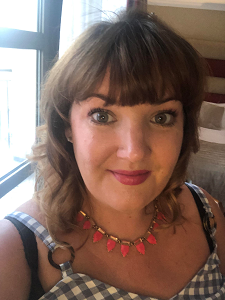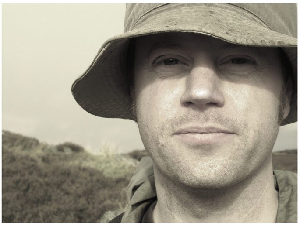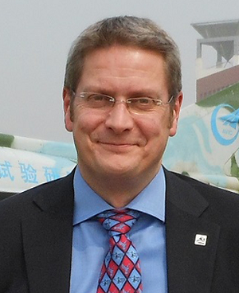Mentoring stories
Mentors and mentees from each of the University Mentoring Scheme Strands, Learning and Teaching Enhancement, Professional Recognition, Research, and Scholarship Development have shared their thoughts on the benefits of mentoring, what they wish they could have asked themselves before beginning mentoring, and advice for anyone considering becoming involved with mentoring.
Learning and Teaching Enhancement
Learning and Teaching Enhancement
Honor McCutcheon: Mentee

Hairdressing Lecturer, Argyll College UHI
What has been the best part of being a mentee for you, what have been the benefits for you? What has surprised you about mentoring?
It has opened up my awareness to other training opportunities I have met so many more fantastic people and engaged and learned positively improving my IT skills for my own classes. Which in turn has given my pupils a better learning experience especially since we had to remote learning.
What advice would you give to someone considering being a mentee on the scheme?
There is something to be gained for everyone out of this experience and would recommend doing it. I’ve learned new ways to reach my students and make new friends at work. I've found a support network I didn’t know existed.
In your own experience, how much time commitment does mentoring take (per month)?
We normally meet once a month for half-hour and emails if required. It’s flexible to meet your needs.
Can you share any changes you have made to your professional practice as a result of being a mentee?
I’m more relaxed and don’t worry so much about everything. It has changed the way I deliver theory and has been more successful and less time-consuming for the students.
Now you have been a mentee, what do you wish you could have asked yourself or thought about before starting that may have prepared you for the mentoring partnership(s)?
That I should have done it sooner and not been scared to try something new.
Stephen Gertsen: Mentor

Sports Lecturer, Moray College UHI
What has been the best part of being a mentor for you, what have been the benefits for you? What has surprised you about mentoring?
I enjoy being able to support people and hopefully share experiences and challenges I have faced that might help them in their circumstances also. It is a great feeling knowing that someone trusts you and is willing to reach out for guidance, support, or even a general catch-up. It has also helped take me out of my bubble at Moray College and find out more about the LTA team at UHI, which has been a good CPD opportunity.
What advice would you give to someone considering being a mentor on the scheme?
I think people should be open to giving it a go, it has benefits for both mentees and mentors and can be an enjoyable and rewarding experience for all parties.
In your own experience, how much time commitment does mentoring take (per month)?
It has not been a huge commitment as a mentor, we agreed at the start to meet every 4 to 5 weeks and this has been working well for us, we have been working together for around 6 months now. We also communicate informally away from the meets, I might drop a line to see how everything is going or if the mentee reaches out, I will make sure to provide support as best I can.
Can you share any changes you have made to your professional practice as a result of being a mentor?
One area, I have identified in myself, which I need to improve, is being a better listener. I am busy on a professional level and have a young family, therefore, in the past, I have not always invested enough time in this. I suppose mentoring has helped develop my emotional intelligence, which can also transfer over to my teaching and student support.
Now you have been a mentor, what do you wish you could have asked yourself or thought about before starting that may have prepared you for the mentoring partnership(s)?
I was relatively confident about what I was getting myself involved with having been part of the Teaching Mentoring Team at Moray College for a couple of years now. I also have a fair range of experience, as a mentor, out with the UHI umbrella, mentoring coaches from governing bodies such as Table Tennis England and Scotland, on a freelance basis. This experience has held me in good stead for this role.
Professional Recognition
Professional Recognition
Scott Timpany: Mentor

Lecturer, Orkney College UHI
What has been the best part of being a mentor for you, what have been the benefits for you? What has surprised you about mentoring?
One of the most enjoyable aspects of mentoring through the Alpine scheme has been the ability to meet colleagues from different parts of the UHI. Working with different mentees from across the University gives more of an insight into the different departments and courses run by UHI at both HE and FE level. It also, provides a great opportunity to learn about various methods of good pedagogic practice taking place and some of the unique and innovative ideas being put in place to aid students in their academic journeys and future career paths.
What advice would you give to someone considering being a mentee on the scheme?
I would encourage anyone who can spare the time to get involved. Becoming a mentor is a nice way to be able to support colleagues across the UHI and to learn yourself of different pedagogic approaches and practices being undertaken. You may even wish to take some of these and try them in your own pedagogy. Through working with the LTA you are supported not only as a mentor but in continuing to develop your own profession and accessing resources which help you to reflect on, enhance and share your own good practices.
In your own experience, how much time commitment does mentoring take (per month)?
This depends on the number of mentees you have, and on the work patterns of individual mentees. Some mentees might look to have regular meetings and feedback on drafts of sections of applications, others may want to work on their applications largely on their own with a smaller number of meetings. Each mentee relationship will be different, and you need to see what fits best to enable them to have the best route through their application. On average you are probably looking at around 2-4 hours per month.
Can you share any changes you have made to your professional practice as a result of being a mentor?
Through my role as a mentor and through my involvement with the LTA, I have learnt the benefit of taking time out to reflect on my own teaching practices and looking for new ways to enhance classes and engagement with students. Ways in which I have developed my own pedagogy from discussions I have been involved with or able to access (e.g. webinars) is the inclusion of more optional seminars within modules to encourage wider reading and team bonding, the development of more employment focussed modules (e.g. placement), and more student-led research projects as assignments to encourage deep learning.
Now you have been a mentor, what do you wish you could have asked yourself or thought about before starting that may have prepared you for the mentoring partnership(s)?
With the mentoring there is often the initial thought process that you may not have anything much in common with the mentee (e.g. you work in very different disciplines) or that you may feel you will not have much knowledge to pass during meetings. I would now say, looking back, not to worry about these things, you will have common ground, you will be able to talk about your own experiences, and you will be able to support them through the application, because you have been there and done it. I would also add that you need to remember it’s not your application and you should look to support and offer constructive comments, but the mentee needs to have the freedom to write what they want and to keep ownership of the application. So, support but don’t direct.
Kathleen Connor: Mentee

Library and Careers Team Leader, Perth College UHI
What has been the best part of being a mentee for you, what have been the benefits for you? What has surprised you about mentoring?
The best part of being a mentee with an excellent mentor is the way that my mentor explained everything so clearly and encouraged me to be more reflective in my professional practice. When I began the journey I was just doing my job without really thinking that what I do has such a huge impact on learners. This has been a great process to show the impact that my professional practice has on learners not only at my AP but across the University and beyond. It also created excellent networking opportunities and cross partnership working.
What advice would you give to someone considering being a mentee on the scheme?
I would absolutely 100% encourage anyone to be a mentee it could be one of the best career opportunities you ever get. Your mentor will encourage you to reflect on your professional practice which builds confidence and helps improve your self esteem. I would encourage anyone in a position to go for it to embrace the opportunity on offer.
In your own experience, how much time commitment does mentoring take (per month)?
In my experience I feel approximately 2-3 hours per month for a good supportive mentor to enable conversation to take place which not necessarily related to the mentoring but nevertheless important; conversations around confidence and motivation. Also some time spent on email communication as well as online meetings. I feel very fortunate that my mentor was able to be flexible to suit both of our needs.
Can you share any changes you have made to your professional practice as a result of being a mentee?
Having a mentor through the process has given me more confidence in my abilities and my professional judgement. I also feel I am more confident to network and share best practice across the partnership and become involved in external communities of practice.
Now you have been a mentee, what do you wish you could have asked yourself or thought about before starting that may have prepared you for the mentoring partnership(s)?
I felt that I was prepared for the partnership as I was aware of colleagues who had gone through the process and recommended it to me. I did however, find that I would become very nervous and anxious before a meeting with my mentor but I needn't have worried as she always put me at ease.
Research
Research
Finlo Cottier - Mentor
Professor in Oceanography, Scottish Association for Marine Science UHI
Now you have been a mentor, what do you wish you could have asked yourself or thought about before starting that may have prepared you for the mentoring partnership(s)?
How much time will it take to do it properly. To engage and reflect on the training available. To really make space to have a meaningful conversation and any follow-up that comes from it.
In your own experience, how much time commitment does mentoring take (per month)?
It was about 2-3 hours per month, but focused into one block rather than spread out so it can become a significant part of one day in the month.
What has been the best part of being a mentor for you, what have been the benefits for you? What has surprised you about mentoring?
Face-to-face training events
Can you share any changes you have made to your professional practice as a result of being a mentor?
I’m probably a better listener, less quick to jump in with advice. I’ve also applied some of the thinking/reflecting techniques on myself.
What advice would you give to someone considering being a mentor on the scheme?
Only do it if you already enjoy that aspect of your work. Do it to develop your university rather than to develop your CV.
Scholarship Development
Scholarship Development
Andrew Wardle: Mentee

Lecturer, Perth College UHI
What has been the best part of being a mentee for you, what have been the benefits for you? What has surprised you about mentoring?
It has been an absolute pleasure to meet with and be guided by someone completely at the top of their field, and it has been a rewarding learning experience – both in terms of subject and process. I have learned a huge amount in an area that I was previously unaware – it has been brilliant – every meeting is a school-day. In the case of this particular project, is also humbling to have been invited to contribute in a small way to something that is likely to benefit the region and the institution.
What advice would you give to someone considering being a mentee on the scheme?
Absolutely go for it – the whole experience has (and continues to be) brilliant! Do it!
In your own experience, how much time commitment does mentoring take (per month)?
We have had Bi-weekly meetings of one hour throughout the year – a bit more frequent at the start, and it will likely be more frequent towards the end of this particular project. There is an element of fieldwork, analysis and write-up, which may not be the case for all projects. Personally, up until now I have probably spent an average of two hours a week in addition to the meetings. That will likely creep up towards the end of the project.
Can you share any changes you have made to your professional practice as a result of being a mentee?
I have become far more aware of the ‘bigger picture’ involving and surrounding my area of knowledge and have also begun to hone my skills in research and organisation.
Now you have been a mentee, what do you wish you could have asked yourself or thought about before starting that may have prepared you for the mentoring partnership(s)?
In hindsight of having been a mentee, I would advise my past self to maintain an open mind and learn from everything. I knew the mentor prior to undertaking the scheme and have been extremely fortunate to have had meaningful dialogue pretty much from the word go. If that were not the case, I would suggest that initial discussions with the mentor are crucial to defining anything to be undertaken – in terms of subject, scope and delivery.
Prof Andrew Rae: Mentor

Professor of Engineering, Executive Office UHI
What has been the best part of being a mentor for you, what have been the benefits for you? What has surprised you about mentoring?
It is always a pleasure and privilege to work with talented people, and this is no exception. I have learned quite a bit as well about an area I’ve worked in before, though not for a while and not with this approach or application. The work is adding to an existing project and may help create a new capability with possible commercial benefits, in addition to the academic ones.
What advice would you give to someone considering being a mentor on the scheme?
Do it. Do it now!
In your own experience, how much time commitment does mentoring take (per month)?
We have fortnightly meetings of 1 hour each. Additional time was needed at the start to frame the project and to help with a literature survey, and additional time will be needed when the fieldwork and subsequent analysis takes place. However, on average I would say I spend 0.5 days a month as a mentor.
Can you share any changes you have made to your professional practice as a result of being a mentor?
Nothing really, I’ve been doing this a while now!
Now you have been a mentor, what do you wish you could have asked yourself or thought about before starting that may have prepared you for the mentoring partnership(s)?
I knew the mentee prior to this collaboration, but even so it was important to understand (and perhaps guide) the mentee’s ambitions for any project. For this reason, and especially with someone less familiar, I think it would have been a mistake to have had too many preconceptions about the topic, format, and extent of any work. The most important phase is the initial discussion, making sure that the effort is of benefit to the mentee and (if possible) of benefit to the mentor.
Rosalind Bryce: Mentor
Director of the Centre for Mountain Studies, Perth College UHI
What has been the best part of being a mentor for you, what have been the benefits for you? What has surprised you about mentoring?
I have really enjoyed establishing a connection with someone who works in a different part of the University and in a different discipline but with whom I share common interests in sustainability and the environment. There have been many benefits - the monthly catch-ups have been an enjoyable learning experience in terms of understanding more about how other parts of the institution work and as a researcher it was been great to learn about approaches in another discipline. The most surprising outcome of the mentoring partnership has been the development of collaborative research ideas and several grant proposals which have brought together our disciplinary approaches to address environmental sustainability issues. While this might not be the usual outcome of a mentoring partnership, there are often opportunities that can be generated by making links across different areas of activity.
What advice would you give to someone considering being a mentor on the scheme?
Be open minded and approach a mentoring partnership as an opportunity for mutual learning about the institution and different areas of activity. Mentoring is a great way to help build stronger networks and cohesiveness across the University which can in turn bring about new opportunities.
In your own experience, how much time commitment does mentoring take (per month)?
I meet with my mentee for an hour every month. In between we might have some email exchange to follow up on some of the directions discussed.
Can you share any changes you have made to your professional practice as a result of being a mentor?
The goal setting process at the beginning of the partnership was helpful for framing discussions and to look back on to measure achievements/success. This is helpful practice across a range of management and supervision contexts.
Now you have been a mentor, what do you wish you could have asked yourself or thought about before starting that may have prepared you for the mentoring partnership(s)?
I think it is simply helpful to have an open mind about how the partnership will work and not have fixed expectations about the dynamics and outcomes. Discussing expectations and goals at the beginning of the partnership, and then revisiting these is very worthwhile.